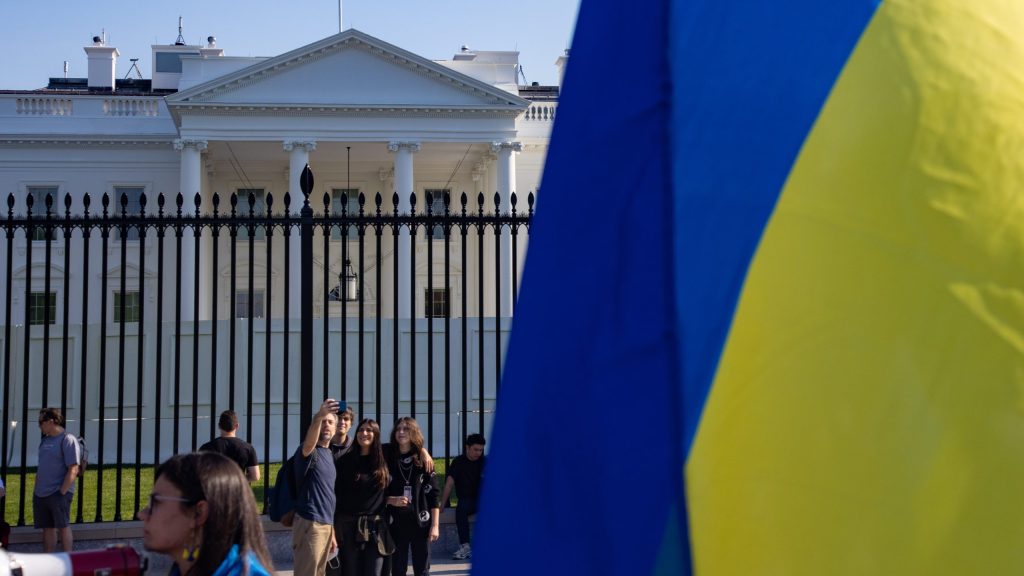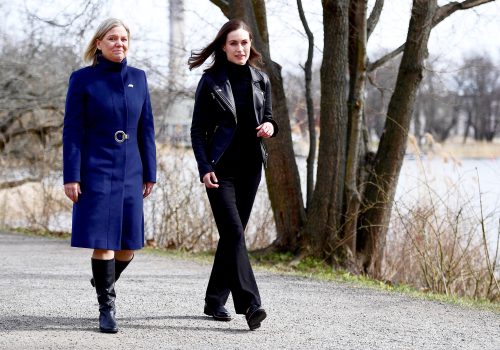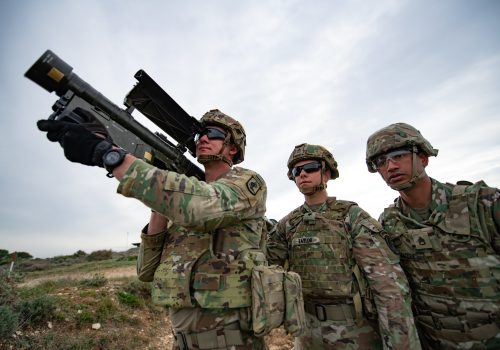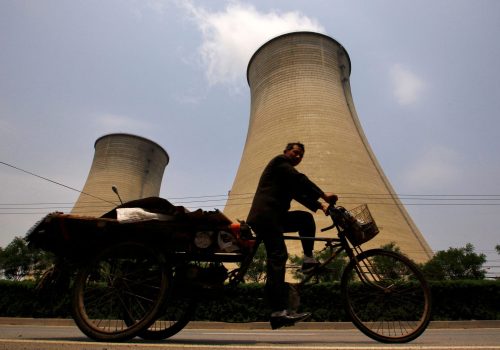On December 29, 1940, nearly a year before the Japanese attack on Pearl Harbor brought the United States into World War II, millions of Americans turned on their radios to hear President Franklin D. Roosevelt explain why they should support Europe’s forces of freedom against Adolf Hitler’s fascist advance.
Americans at the time were deeply uncertain about whether they should be involved at all in the distant European war, though they were aghast at the reports of its horrors. Roosevelt used one of his famous fireside chats to convince them that the United States should rapidly and decisively deploy its vast industrial capacity on freedom’s behalf.
“We must be the great arsenal of democracy,” he said in the firm, familiar voice that Americans had let into their living rooms for most of that decade. “We have furnished the British great material support and we will furnish far more in the future. There will be no ‘bottlenecks’ in our determination to aid Great Britain. No dictator, no combination of dictators, will weaken that determination by threats of how they will construe that determination.”
Eight decades later, President Joe Biden must decide just how far he is willing to go in deploying an updated “great arsenal of democracy” to empower Ukraine to defeat today’s European tyrant, Russian President Vladimir Putin. What Biden’s administration and its partners have done thus far, through sanctions and military support, has been remarkable—but it remains insufficient as Putin escalates his offensive on Ukraine’s east and south.
As US Secretary of State Antony Blinken and Secretary of Defense Lloyd Austin visited Kyiv Sunday, it is no longer enough for Biden to pledge that the United States will defend every inch of NATO territory, as required by all twenty-nine other Alliance members under Article 5 of its founding treaty. Although that commitment is commendable and crucial for member states bordering Russia and Ukraine, it has been construed by Putin as open game on Ukraine itself (which is not in the Alliance).
It’s now time for Biden to commit Americans and, to the extent possible, the democratic world more broadly to defending Ukraine’s sovereignty, independence, and freedom. That means not only extending political support and rhetorical common cause, but also sufficient intelligence and military assistance to halt Putin’s ongoing advance. Anything less would be contrary to Biden’s own stated convictions.
As Biden himself said during his State of the Union address this year, “Throughout our history we’ve learned this lesson when dictators do not pay a price for their aggression they cause more chaos. They keep moving. And the costs and the threats to America and the world keep rising.”
He continued: “That’s why the NATO Alliance was created to secure peace and stability in Europe after World War II…Putin’s latest attack on Ukraine was premeditated and unprovoked. He rejected repeated efforts at diplomacy. He thought the West and NATO wouldn’t respond. And he thought he could divide us at home. Putin was wrong. We were ready.”
But are we really ready for the next stage, which is growing uglier and more dangerous with each day of Putin’s advance? Only Ukraine’s survival as a free country can begin the reversal of a three-decade downward trajectory of democratic freedoms in Europe and the world—which, in turn, endangers all the forward progress of Europe since World War II.
The newest report by the V-Dem Institute at the University of Gothenburg in Sweden, which produces the largest global dataset on democracy in the world, found that “the level of democracy enjoyed by the average global citizen in 2021 is down to 1989 levels,” meaning that the last thirty years of democratic advances following the collapse of the Berlin Wall and the Soviet Union have now been fully reversed.
The number of countries that V-Dem considers liberal democracies was down to just thirty-four in 2021, the smallest number since 1995. “Together, autocracies now harbor 70% of the world population,” the report warns. That accounts for some 5.4 billion people, it adds.
Democracy scholars are tracking disturbing evidence that autocrats are growing bolder. Putin’s full-scale invasion of Ukraine, an independent country led by an elected government, followed five military coups in 2021—the largest single-year increase of the previous two decades, the report finds. V-Dem sees the dangers increasing within established democracies as well.
“Polarization and government misinformation are also increasing,” it writes. “These trends are interconnected. Polarized publics are more likely to demonize political opponents and distrust information from diverse sources, and mobilization shifts as a result.”
In his new book, “The Revenge of Power: How Autocrats are Reinventing Politics for the 21st Century,” Moisés Naím writes about the “three Ps” that are driving this trend: populism, polarization, and post-truth. He sees this ilk of autocratic power as “malign” and “incompatible with the democratic values at the center of any free society.”
A great deal separates the international situation Roosevelt confronted in 1940 from the one facing Biden in 2022. What connects these two inflection points is the danger of aggressive authoritarianism and the insufficient common cause to confront it.
When Roosevelt spoke in December 1940, his appeal came three months after the signing of the Tripartite Pact among Germany, Italy, and Japan, which created a defense alliance of autocracies that was intended to deter the United States from entering the war.
On February 4 of this year, the bipartite “Joint Statement of the Russian Federation and the People’s Republic of China” doesn’t seem to go nearly as far—in that it doesn’t commit either side to a defense alliance. But its language is hardly less ambitious, and is similarly aimed at the United States.
And this time, the two authoritarian great powers are armed with nuclear weapons.
“Friendship between the two States has no limits,” reads the 5,300-word text (which came just twenty days before Putin launched his war), “[and] there are no ‘forbidden’ areas of cooperation.”
As was the case then with Roosevelt, Biden must also weigh the dangers of the moment against the future perils born of an insufficient response.
“If we are to be completely honest with ourselves,” Roosevelt told Americans, “we must admit that there is risk in any course we may take. But I deeply believe that the great majority of our people agree that the course that I advocate involves the least risk now and the greatest hope for world peace in the future.”
His message for Biden is clear: Do more now to stop Putin, or pay the consequences later.
This article originally appeared on CNBC.com
Frederick Kempe is president and chief executive officer of the Atlantic Council. You can follow him on Twitter @FredKempe.
THE WEEK’S TOP READS
#1 America’s Interest in Ukrainian Victory
Andrew A. Michta | CITY JOURNAL
In this smart reflection, Andrew Michta emphasizes what’s at stake for the United States in Ukraine. In light of the partnership between Putin and Chinese President Xi Jinping, he writes, it is a mistake to separate Russia’s invasion of Ukraine from China.
With that in mind, Michta writes, “Russian defeat would free the United States to focus on the Indo-Pacific, in the process solidifying NATO and finally bringing about a genuine rearmament of Europe.”
But to help Ukraine defeat Russia, merely trying to force a stalemate is insufficient. Instead, Michta believes, the West faces a stark choice: “[G]o for a stalemate and all but ensure that Putin, once he has reconstituted his forces, will invade yet again (this time with a greater risk of escalation into NATO territory); or supply Ukraine with what it needs today to defeat Putin’s army and, in doing so, transform the regional security equation.” Read more →
#2 Ukraine Can Win: The Case Against Compromise
Alina Polyakova and John Herbst | FOREIGN AFFAIRS
In this week’s second must-read, the Atlantic Council’s John Herbst and Alina Polyakova provide an in-depth explanation of what the United States and Europe must do to help Ukraine not just hold off, but actively defeat, Russia.
“Winning in Ukraine won’t be cheap, materially or politically. The United States will need to spend more than the $14 billion that Congress committed to Ukraine last month to achieve all these aims. It will need to pressure its allies in Europe. And it will have to manage more nuclear saber rattling from Moscow by sending clear messages about what Washington will do if Putin resorts to using nuclear weapons in Ukraine, rather than constraining itself by promising not to take certain steps.”
Yet if Ukraine is able to defeat the Russians, it will prove one of the smartest investments the United States has ever made. Read more →
#3 The French Election is a Glimpse at the Volatile Future of Western Politics
Catherine Fieschi | POLITICO
Against the backdrop of today’s presidential election in France, and with the specter of populism alive and well in Western democracies, this thoughtful analysis from Catherine Fieschi argues that populism is less of a new political state than likely a transition to something else.
The French election, Fieschi writes, “ultimately offers a glimpse at the future of Western politics: Whether populist politicians take power or not, they are certain to continue to upend our politics for years to come.
She continues: “The once emotional charge of casting a vote, of contributing to political decisions, of making history by crafting compromises that benefit entire communities — all this needs to be reinvented and replenished. We need more voting, more often, more campaigns, more opportunities to discuss what normally comes around only every few years, lest we let populism deliver all the wrong excitement of the occasional, binary and oppressive referendum.” Read more →
#4 Interests, not values, underpin Asia’s ambivalence about Russia
THE ECONOMIST
To understand the emerging non-aligned movement in the new global superpower contest, read this Economist article about how Asian nations are responding to Russia’s invasion of Ukraine.
Despite largely being democracies, the Economist writes, “few Asians share the European and American perception of the war as a grand battle between democracies and autocracies. For many of them, including most of America’s allies in Asia, responses to Russia’s invasion have been dictated first by cold calculations of interests, with values coming a distant second.” Read more →
#5 Climbing the ladder: How the West can manage escalation in Ukraine and beyond
Richard D. Hooker | ATLANTIC COUNCIL
Amid calls for further military aid to Ukraine, one consistent concern is that of escalation. In this smart analysis, the Atlantic Council’s Richard Hooker examines the potential points of escalation—and explains how the West can manage them while still supporting Ukraine.
Crucially, Hooker writes, “[t]he best the West can do is prepare for the worst, keep its nerve, and employ all its resources when its vital interests and most cherished values are attacked. Things are very close to that stage now. At stake is an international order founded on something other than brute force, imperial ambition, and autocratic self-help. A Russian victory in Ukraine, even at great cost, places a vengeful Putin on Europe’s doorstep, his ambitions partially achieved but still unrealized. The next blow will fall on NATO’s eastern flank. Now is the time to ensure that never happens.” Read more →
Atlantic Council top reads
Further reading
Fri, Apr 15, 2022
Going Nordic: What NATO membership would mean for Finland and Sweden
New Atlanticist By
As both countries inch toward formally joining the Alliance, we answer six burning questions about what the future holds.
Wed, Apr 20, 2022
The next National Defense Strategy is coming. These seven points are key to understanding it.
New Atlanticist By
Our experts break down what we know so far about the document that will guide the Pentagon's policy making in the coming years, and what burning questions remain.
Fri, Apr 22, 2022
How Putin made the case for the G7’s clean green plan
New Atlanticist By
To counter China and decarbonize the Global South, the West must drive its plan forward with ambition.
Image: Pro-Ukraine demonstrators gather in front of the White House on April 23, 2022, to ask the Biden administration for tougher sanctions on Russia and more military aid to Ukraine Photo by Bryan Olin Dozier/NurPhoto/REUTERS



